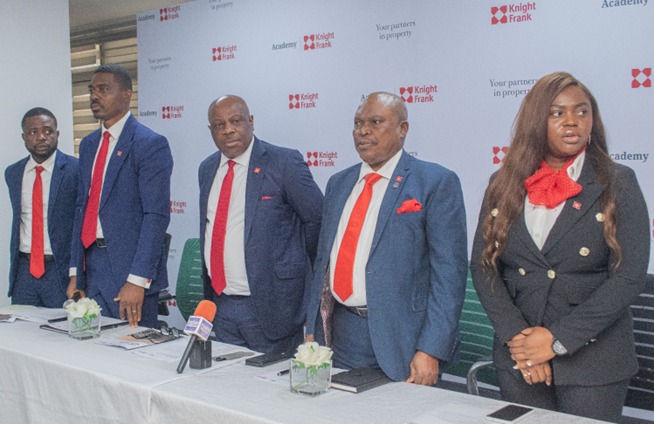Business
Real Estate Report: Knight Frank Spotlights Infrastructure Growth, Market Resilience, Emerging Trends

Knight Frank Nigeria’s has highlighted the resilience of Lagos’ real estate sector, pointing to stabilising macroeconomic conditions, rising office occupancies, infrastructure-driven opportunities, and a fast-expanding digital economy as defining features of the market in the first half of the year.
This disclosure was made during a media briefing in Lagos recently to announce the release of the H1 2025 edition of its flagship research report, “the Lagos Market Update.”
Insights from the report, alongside commentaries from the firm’s leadership, underscore how affordability pressures, shifting consumer preferences, and investor confidence are reshaping the city’s property landscape.
The report shows that Nigeria’s economy gained some traction in the first half of 2025, with inflation falling from 34.8 percent in December 2024 to 22.97 percent in May 2025 (partly due to CPI rebasing by the National Bureau of Statistics), while the naira appreciated from N1,661 to N1,539 to the US dollar. These shifts influenced the residential, office, retail, industrial, and infrastructure markets across the city.
Speaking at the media briefing, Frank Okosun, Senior Partner/CEO of Knight Frank Nigeria, said: “The Lagos property market is a mirror of Nigeria’s economic realities. In the first half of 2025, we witnessed significant reforms that stabilised the naira, a notable drop in inflation, and a renewed push for infrastructure development. These shifts are directly shaping the dynamics of real estate across the city.”
Lanre Sonubi, Head of Marketing and Corporate Communications at Knight Frank Nigeria, added: “This report is not just a presentation of figures, it decodes the implications of market shifts. For instance, while office occupancies are rising, rents are softening, creating opportunities for tenants. These insights are essential for investors, occupiers, and policymakers who must anticipate change and make informed decisions.”
According to the report, the residential sector is adjusting to changing demand patterns, with tenants exploring suburban areas such as Ikorodu and Ibeju-Lekki, while short-let apartments and studio housing continue to grow in popularity.
The Lead Research Analyst at Knight Frank Nigeria, Mr Daniel Fabi also noted that captures the office market showing resilience as occupancy in Grade A spaces rose from 65 percent to 73 percent, even though prime rents in Ikoyi softened slightly to US$55 per square metre. “Eko Atlantic City is consolidating its status as a new business hub, with MTN Nigeria and First Bank relocating their headquarters there”, he added.
Meanwhile, in the retail sector, consumer preferences are shifting towards hyper-local shopping outlets, with local players such as Bokku! Mart expanding rapidly to over 150 branches, outpacing international brands. The industrial sector also posted gains, supported by increased manufacturing activity and policy reforms such as the Federal Government’s “Nigeria First” initiative.
Infrastructure development remains a key growth driver. Projects such as the Lagos-Calabar Coastal Highway, the 68km Green Line rail, and the Opebi-Mende Bridge are expected to open up new opportunities for real estate and economic activity.
The report also highlighted the rapid growth of digital infrastructure, with Lagos now hosting 18 data centres and more under construction. Rack Centre commissioned a new 12MW facility in April, while Open Access Data Centres announced a US\$240 million expansion that will double its capacity to 24MW by 2027, further positioning Lagos as a hub for Africa’s digital economy.
Knight Frank Nigeria’s H1 2025 Lagos Market Update is available for download on the firm’s website: https://www.knightfrank.com.ng/.
